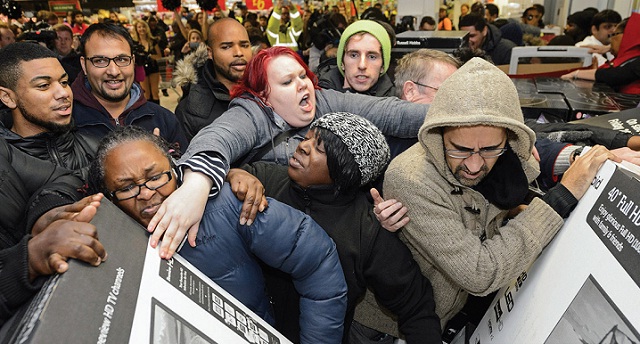
Why do shoppers throw punches over bargains? A marketing expert explains the psychology
Kampala, Uganda | COLLEEN P. KIRK | Black Friday, the most celebrated shopping day of the year, abounds with tales of fistfights over discounted televisions or even stampedes as consumers rush to get that low-priced sweater they saw in an ad.
Many people chalk it up to bad behavior. But marketers like me have a term to describe one feeling that contributes to it: psychological ownership.
Have you ever felt as if another driver stole your parking spot? Or were supremely miffed when someone else nabbed the last red sweater that you had your eye on? And isn’t it irritating when someone else receives credit for your idea? If so, you experienced psychological ownership.
In other words, we often take ownership over a thing or service in our minds before we actually give up the cash that makes it legally ours. And retailers use this psychological trick to get us to buy more of their stuff – or spend more. It also makes us more likely to brag about our purchases, valuable word-of-mouth advertising for those brands.
While the concept itself is well-known, there’s been little research on how people actually react when someone seems to infringe on their psychological ownership. My colleagues Joann Peck and Scott Swain and I conducted several studies to find out.
That feeling that something is yours
Psychological ownership is an important concept in marketing. Sellers are motivated to elicit it because having it makes you want to buy their goods.
An example of this is potato chip maker Lay’s “Do Me a Flavor” contest, which began in 2008 and invited customers to suggest and vote on new chip flavors. By tickling customers’ sense of ownership in the product and the brand, it was a remarkable success in markets around the world.
But it doesn’t have to be a major campaign. A simple ad or invitation to touch can have the same impact.
There are three factors that foster psychological ownership: If you can touch or control something or even imagine doing so. An example is putting something in your shopping cart – whether physical or virtual online. If you have customised something or invested your efforts in designing it. When the server brings the food to your table and places your dish in front of someone else, you’re quick to say, “That’s mine.” And intimate knowledge. If you grew up with a product, have always used it or have a special or unique way of using it, the odds are good you feel psychological ownership over it.
Furthermore, you can feel psychological ownership over pretty much anything that doesn’t legally belong to you, from the last chocolate truffle in a display case to the dream home you found on Zillow, and even intangible things like ideas.
Psychological ownership in action
To find out how people react when their psychologically owned property is threatened, my colleagues and I conducted a series of experiments. Each was designed to elicit or manipulate feelings of ownership in consumers and then have other people communicate, or signal, psychological ownership of the same product.
In the first one, 58 college students participated in a simulated dining study in our lab. At one point, they each poured themselves a cup of coffee from a bar and customised it with condiments like sugar, frothed milk and syrup, which helped create strong feelings of ownership of the coffee.
Later, after serving participants a piece of cake at their table, a waiter asked, “Is everything OK?” The waiter also, in half the cases, moved their coffee cup for no apparent reason.
After the “bill” came, we found that participants whose coffee cup was moved tipped the server 25 percent less. In a subsequent survey, these participants reported that they felt the server had infringed on their territory and said they would be less likely to return to such a restaurant.
A second experiment extended this territorial feeling to something less tangible: an artistic design. As part of volunteer work for a local nonprofit, 162 university students decorated folders for children’s educational materials. They either copied a design onto the folder – which elicits low psychological ownership – or created their own design – leading to high psychological ownership. After they finished, a staff member walked up to half the participants and said, “That looks like my design!”
Later, as the staff member left the room, she “accidentally” dropped a pen, supposedly without noticing. We found that participants who designed their own folder and were told by the worker that it looked like hers were 66 percent less likely to pick up the pen and return it.
A later survey showed that these participants indeed felt that the staff member infringed on what they considered theirs. As a result, they were also less likely to donate to the nonprofit or volunteer again.
Interestingly, they reported they would be more likely to post a selfie with their folder on social media – in other words, they tried to defend their psychological ownership by communicating their own claim to ownership.
 The Independent Uganda: You get the Truth we Pay the Price
The Independent Uganda: You get the Truth we Pay the Price



